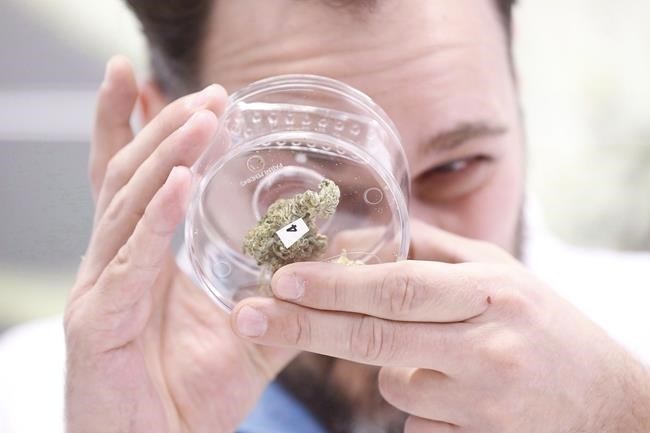
Jean Marc checks out a sample at a cannabis store in Winnipeg on October 17, 2018. Marijuana has been legal in Canada for a month already but immigration lawyers and cannabis executives say when it comes to getting into the United States, the worst may be yet to come. As Canadians get used to the fact that cannabis is no longer against the law in their country, some experts fear they will forget the perils that past and present marijuana use still poses for those seeking to cross the Canada-U.S. border.
Image Credit: THE CANADIAN PRESS/John Woods
November 21, 2018 - 9:30 AM
WASHINGTON - People who work, invest or partake in Canada's legal cannabis industry will continue to risk a lifetime ban from the United States as long as the drug remains a controlled substance under U.S. federal law, lawyers say — a prohibition some American pot producers are trying to change.
U.S. Customs and Border Protection officials won't yet say how many would-be visitors from Canada have run afoul of a peculiar contradiction: Cannabis is legal for possession, cultivation and sale in a number of U.S. states but still against federal law.
And with legal cannabis only a month old, a number of Canadians and their lawyers already have first-hand knowledge of the perils that await users, investors and industry workers at the Canada-U.S. border.
"It's a double standard — they're not enforcing it in the states but they are enforcing it at the borders," said Len Saunders, a Canadian lawyer in Blaine, Wash., who specializes in U.S. immigration law.
"You can't take a hands-off approach with the states and allow them to sell it, and in the same breath enforce federal laws to the T at ports of entry. It's inconsistency, it's hypocrisy and it creates this confusion."
U.S. officials initially warned that any Canadian who gave off any whiff of pot involvement — from using the drug to working or investing in the industry — risked being banned or denied entry. The agency later said industry workers would generally be let in as long as they were travelling for reasons unrelated to their work.
Saunders said he spoke to one would-be traveller who was intercepted last week in Vancouver and is now barred from the U.S., because he wanted to tour a Las Vegas cannabis production facility in which he'd recently become an investor.
"He's kind of shellshocked right now," Saunders said. "He said, 'I didn't know anything about this.' I said, 'Haven't you been reading the news?' "
The investor's visit, part of a tour arranged by his financial adviser, happened to coincide with MJBizCon, a major cannabis industry conference last week in Las Vegas. A number of travellers who were bound for that conference have reported being pulled aside for secondary screening.
The man — Saunders wouldn't disclose his name — told officials he's just an investor, had never used pot and would never have tried to travel had he known the risk. Border authorities had been notified about the Vegas conference and told to be on the lookout for Canadian travellers, the lawyer added.
At Marigold PR, a marketing and public-relations firm in Toronto with a number of cannabis-industry clients, travel to the U.S. is on hold and cross-border work is being done via Skype, FaceTime and other electronic means until the legal landscape becomes clearer, said co-founder Bridget Hoffer.
"We are standing back and waiting to see what happens, because there are questions and answers that are challenging," Hoffer said. Some U.S.-bound cannabis executives have even resorted to shipping their cellphones and business cards to U.S. destinations in advance to avoid border scrutiny, she added.
If the problems persist, many Canadian firms might end up focusing their international efforts on markets other than the U.S., such as Germany, Australia and Latin America, Hoffer said.
Some U.S. producers, meanwhile, are redoubling efforts to push a change in the federal law, which denies American companies the access to capital markets and financial services enjoyed by their Canadian counterparts.
Terra Tech Corp. chief executive Derek Peterson took out a full-page ad in the Wall Street Journal last month aimed at convincing President Donald Trump that the federal prohibition is forcing the U.S. industry to leave billions of dollars on the table. He's now producing an ad for the U.S. president's preferred medium: television.
"We're going to run that in the environments that we think the president and his administration pays attention to, like 'Fox and Friends,' " Peterson said.
American officials can't yet say for sure if there's been any change in the number of people being turned away at the Canada-U.S. border, although anecdotally, there has been no significant change, said Customs and Border Protection spokeswoman Stephanie Malin. The agency expects to be able to release more detailed statistics early next month.
"The bigger issue is people thinking the slate has been wiped clean," said Henry Chang, a Toronto-based immigration lawyer who has spent the last several months warning Canadians about the dangers.
"I think we're going to start seeing more people getting banned, not because of them smoking marijuana after Oct. 17, but just because they think they have nothing to hide and they blurt out that they smoked marijuana when they were 18."
— Follow James McCarten on Twitter @CdnPressStyle
News from © The Canadian Press, 2018